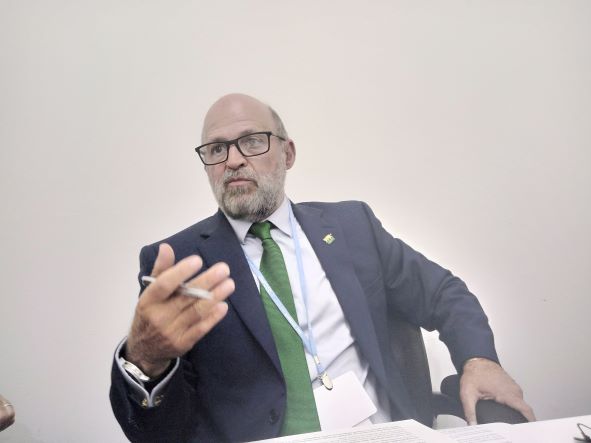PHOTO: Global Environment Facility (GEF) CEO Carlos Manuel Rodriguez speaks to journalists at COP27
By Evelyn Kpadeh Seagbeh
The Global Environment Facility’s chief executive officer and chairperson did not mince his words identifying the role of the media in tracking funds given to combat the global threats posed by climate change.
The media, Carlos Manuel Rodriguez says is critical in tracking how countries use the monies that are given to them whether grant monies or loans that are meant for environmental or climate change initiatives in their respective countries.
“We work in countries where the perceptions of corruption are high, but that wouldn’t be a limitation for us to work. That is why it is so important for us to have you all journalists doing your work.”
“Countries come here (at the COP) and they brag about how good they are doing, but they have not been totally transparent in what they do at the country level. There are lots of data materials that you need to track from here.”
Carlos continues by saying: “The country needs to be reporting to the people of how they are doing with their climate commitment, but that is not happening because the journalists are not there yet. I hope this can be the first generation of journalists that do political control on climate action. At the country level.”
The Global Environment Facility is the world’s largest funder of biodiversity protection, nature restoration, pollution reduction, and climate change response in developing countries with an investment portfolio worth about 22 billion, and co-financing more than five thousand national and regional projects and Liberia is one of the benefiting countries.
Article 13 of the Paris Agreement from the United Nations Framework Convention on Climate Change calls for transparency, accountability, and monitoring for countries to report to the convention.
For thirty years, the Global Environment Facility has been a major partner in supporting some of Liberia’s environmental and climate change programs.
The GEF’s support to Liberia has focused on creating a system of protected areas, working with local communities in land tenure, and sustainable harvesting, among other things.
Emphasizing the role of the media, the GEF CEO says is to ensure that there is transparency and that GEF project countries deliver on their deliverables and adequately account for money given for climate and the environment programs, added the role of the media is critical.
In the case of Liberia and countries receiving money from the GEF, Carlos called on the media to pay close attention to monitoring countries’ implementation of the National Determined Contribution (NDC).
NDC is a climate action plan to cut emissions and adapt to climate impacts that each party to the Paris Agreement signed. It requires nations to establish an NDC and update it every five years detailing policy actions.
On November 8, 2022, the Liberian delegation at the COP27 launched the country’s revised Nationally Determined Contribution implementation and keen among the country’s national goals is to reduce greenhouse gas emissions by 64 percent by 2030 and prioritize climate actions with a multi-stakeholder engagement approach.
In other news, at COP27, 7 countries jointly pledged added support to the Global Environment facility for addressing the most urgent climate action needs of the least developing countries.
The new portfolio “The Least Developed Countries Funds (LDCF) is to the tune of US $ 105.6 million with Denmark, Finland, Germany, Ireland, Slovenia, Sweden, Switzerland, and the Walloon Region of Belgium contributing the new funding.
The new commitment from the 7 nations now adds to the $413 million that 12 donor countries have pledged to support the Least Developed Countries Funds (LDCF) at COP26 in Glasgow last year.
This story is produced as part of the 2022 Climate Change Media Partnership, a journalism fellowship organized by Internews’ Earth Journalism Network and the Stanley Center for Peace and Security.

